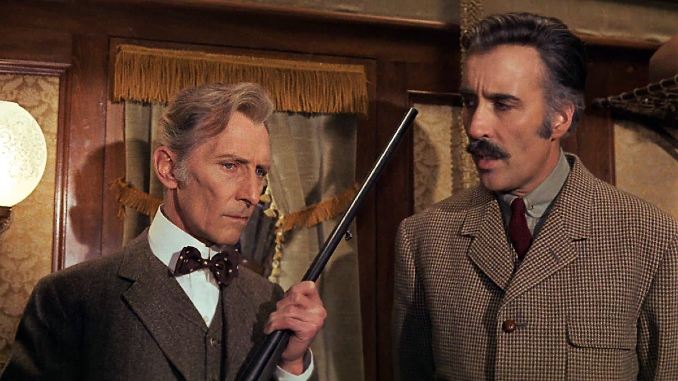Horror Express Saw Peter Cushing and Christopher Lee Elevate Nonsense to Greatness for the Last Time

Peter Cushing and Christopher Lee were both excellent actors and exceedingly elegant men who spent much of their long film careers starring in complete nonsense. In most conceivable senses, they were just too good for many of the movies in which they starred, and yet it never came across in their performances. They didn’t know how to phone it in and, as a result, they would elevate even the hokiest of hokum. And that was in their separate appearances. When the good friends appeared together, as they did more than 20 times between the 1950s and the 1980s, the effect was multiplied manyfold. Usually they’d be on opposite sides of the good/bad divide, but every so often they’d work as a team to fight whatever ridiculous monster was sent their way—this was the case with Horror Express.
It’s 1906, on a train from Shanghai to Moscow. Famed anthropologist Professor Sir Alexander Saxon (Lee) is secretly transporting his latest discovery in the baggage car. Noticing his friend’s caginess, Dr. Wells (Cushing) persuades a porter to investigate the mysterious trunk. The porter does so—and the next morning he is found dead, his eyes as white as boiled eggs and bleeding from every facial orifice. Whatever was in the case is nowhere to be seen, but soon the train is full of bodies with boiled-egg eyes and bleeding faces. Even when Saxon’s discovery is found, and the body disposed of, the carnage is far from over…
Lee and Cushing’s most famous collaborations—the Dracula and Frankenstein franchises; The Hound of The Baskervilles—had all been projects with vaunted British studio Hammer. By 1972 however, that association was winding down, and they’d been increasingly indulging in their ghoulish adventures elsewhere. Horror Express was a Spanish-British co-production engineered by American producer Bernard Gordon. Like the majority of films shot in Spain at the time, the sound was post-synced, with the two Brits dubbing themselves for the English-language version.
Horror Express is widely acknowledged (though not in the actual credit sequence) as a rather loose adaptation of the John W. Campbell novella Who Goes There?, which also provided the source material for the The Thing movies. Horror Express doesn’t actually get to its Thing-like elements until a significant way into the film, when the creature’s corporeal form has been killed and it has found a new home for itself inside the body of Inspector Mirov (Julio Peña); even then, it only makes one more leap throughout the whole duration. And we always know who’s being inhabited, which means the tension never quite hits the heights of John Carpenter’s The Thing.
-

-

-

-

-

-

-

-

-

-

-

-

-

-

-

-

-

-

-

-

-

-

-

-

-

-

-

-

-

-

-

-

-

-

-

-

-

-

-

-








































